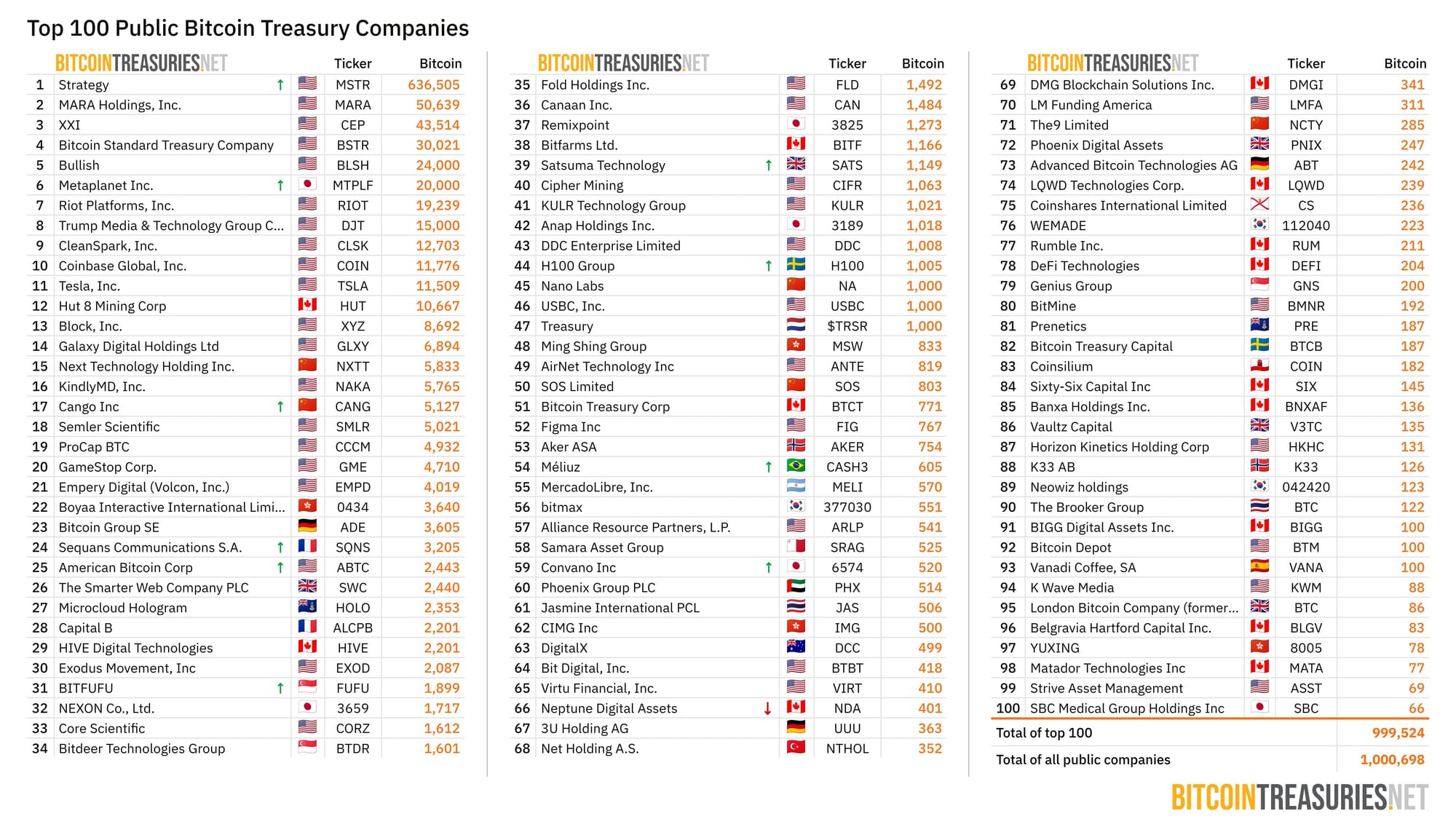As of September 2025, publicly traded companies have collectively accumulated over 1 million Bitcoin (BTC) on their balance sheets, marking a significant shift from speculative trading to strategic asset allocation. This represents more than 5% of Bitcoin’s circulating supply of 19.91 million, highlighting the growing institutional confidence in digital assets, according to the information from BitcoinTreasuries.net.
Strategy Leads Corporate Bitcoin Holdings

Strategy Inc. remains the dominant corporate holder, with 636,505 BTC, valued at approximately $70.7 billion. CEO Michael Saylor has consistently framed Bitcoin as “the best treasury reserve asset in the world,” citing its fixed supply and independence from centralized monetary policy as key advantages. Michael Saylor, CEO of Strategy Inc., said:
“There will never be more than 21 million #bitcoin”
By holding such a substantial share of Bitcoin’s total supply, Strategy not only demonstrates corporate commitment to digital assets but also reinforces Bitcoin’s position as a long-term store of value rather than a speculative instrument.
Other Major Corporate Bitcoin Holders
Trailing Strategy, MARA Holdings holds 50,639 BTC (~$5.6 billion), combining mining operations with treasury management to optimize digital asset allocation. Other notable treasury-focused firms include XXI and Bitcoin Standard, holding $4.8 billion and $3.3 billion in BTC, respectively.
Interestingly, Tesla, though not a dedicated treasury firm, maintains 11,506 BTC, despite previously selling holdings, which contributed approximately $600 million to the company’s earnings in Q4 2024. These figures mean that corporate adoption of Bitcoin extends beyond treasury specialists.
U.S. Dominance and Global Bitcoin Adoption
The corporate Bitcoin sphere is largely dominated by the U.S.-listed firms, accounting for 12 of the top 15 holders. International outliers include Metaplanet in Japan (20,000 BTC), Hut 8 Mining Corp. in Canada (over 10,000 BTC), and China’s Next Technology (5,833 BTC).
This geographic distribution reflects differences in regulatory clarity, market infrastructure, and institutional readiness. U.S. companies benefit from clearer frameworks for digital asset holdings, while other regions are gradually aligning corporate strategies with evolving crypto regulations.
Why Companies Are Allocating to Bitcoin
Corporate adoption is driven by strategic considerations beyond short-term speculation. Key rationales include:
- Treasury Diversification: Bitcoin offers an alternative asset class that is largely uncorrelated with equities and bonds.
- Inflation Hedge: BTC’s fixed supply provides a defense against currency devaluation and macroeconomic uncertainty.
- Store of Value: Many executives, including Michael Saylor, regard Bitcoin as a long-term treasury reserve.
Market Implications of Corporate Bitcoin Treasuries
The accumulation of Bitcoin by public companies has material market implications:
- Liquidity and Price Stability: Large-scale holdings reduce the available supply on exchanges, potentially influencing market volatility.
- Investor Confidence: Visible corporate adoption signals legitimacy and encourages institutional participation.
- Strategic Asset Allocation: Companies are increasingly treating Bitcoin as a core treasury asset, not a speculative instrument, contributing to a maturation of the market.

Disclaimer: All materials on this site are for informational purposes only. None of the material should be interpreted as investment advice. Please note that despite the nature of much of the material created and hosted on this website, HODL FM is not a financial reference resource, and the opinions of authors and other contributors are their own and should not be taken as financial advice. If you require advice. HODL FM strongly recommends contacting a qualified industry professional.





